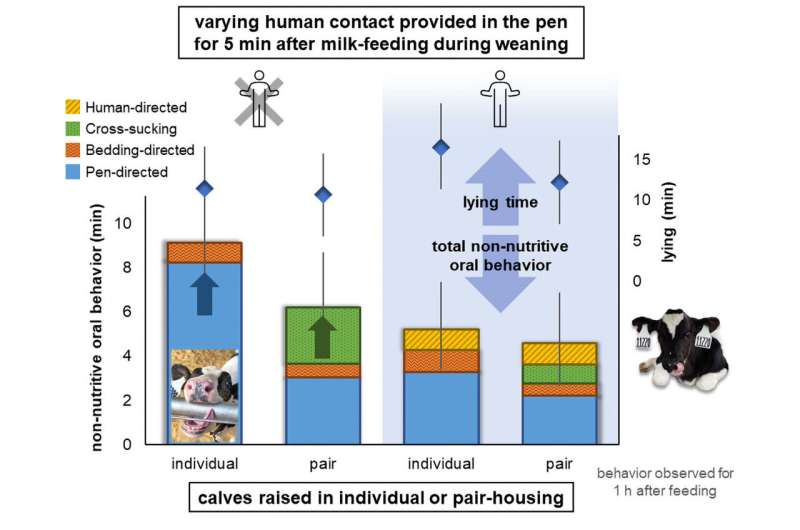Human contact makes for happier and healthier dairy calves

Calves’ well-being, including their physical and emotional health, is always top of mind for those in the dairy industry, particularly during the weaning stage. In a recent study appearing in JDS Communications, researchers from the University of Florida demonstrated that socialization with other calves and humans—even for as little as five minutes—can improve overall calf well-being.
Lead investigator Emily K. Miller-Cushon, Ph.D., of the University of Florida Department of Animal Sciences, Gainesville, FL, U.S., explained that assessing how a calf is feeling is usually done by observing behaviors, especially abnormal behaviors which can include “sucking or chewing on their housing pens or bedding, on their pen-mates or human handlers—all of which are common in the period after calves are fed.” These kinds of behaviors are generally considered signs of frustration and can affect calves’ health.
“Calves are active and seek stimulation following milk-feeding, so providing more things to do, like brushing, may calm calves, reducing sucking behaviors after feeding and increasing rest,” said Miller-Cushon.
Because studies have already shown that calves seek out human contact, the researchers set out to understand how the human-animal relationship might impact these sucking behaviors. To find an answer, the team randomly assigned 28 Holstein heifer calves to either individual or paired housing from birth to seven weeks old and standardized their contact with humans over this period to include feeding and health exams.
The calves began weaning at six weeks old; over a four-day study period during weaning, the researchers introduced additional human contact and continuously video-recorded its effects on behavior. During this window, each calf received two days of their normal amount of human contact and two experimental days, in which they received an extra five minutes of neck scratches with their familiar human handlers.
Why neck scratches? “We know from previous research that calves seem to enjoy tactile contact including brushing from humans. This kind of contact can reduce their heart rates, and calves lean into the scratches and stretch out their necks for more,” explained Miller-Cushon. “We also see that calves suck on the pen less when they have a stationary brush that they can rub against.”
After analyzing the video recordings, the study team concluded that human contact does impact calf behavior and helps to promote calm and well-being. Those five minutes spent with humans reduced the duration of calves’ sucking behaviors and increased their amount of rest after meals. This decrease in sucking behavior was especially pronounced in the calves housed alone compared with those that had a pen-mate—indicating the importance of socialization not just with humans but also with other calves.
Miller-Cushon was careful to note that the human contact in the study did not eliminate sucking behaviors entirely, however: “Our findings showed benefits of human contact, but the results also suggest that our work is not done in finding the most beneficial and natural methods of feeding and housing our dairy calves.”
More information:
S.B. Doyle et al, Influences of human contact following milk-feeding on nonnutritive oral behavior and rest of individual and pair-housed dairy calves during weaning, JDS Communications (2022). DOI: 10.3168/jdsc.2022-0264
Citation:
Human contact makes for happier and healthier dairy calves (2023, February 20)
retrieved 20 February 2023
from https://phys.org/news/2023-02-human-contact-happier-healthier-dairy.html
This document is subject to copyright. Apart from any fair dealing for the purpose of private study or research, no
part may be reproduced without the written permission. The content is provided for information purposes only.
For all the latest Science News Click Here
For the latest news and updates, follow us on Google News.

